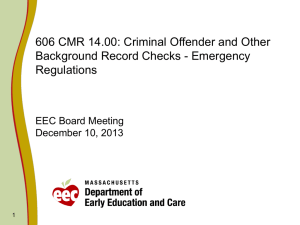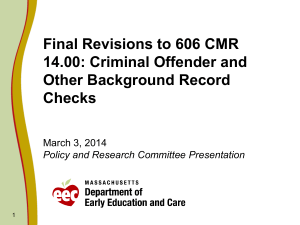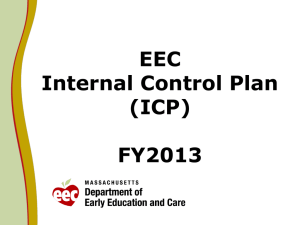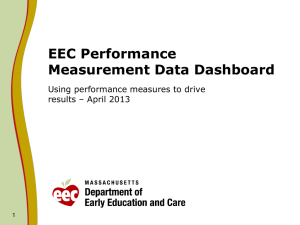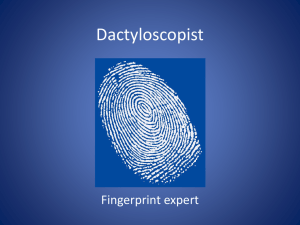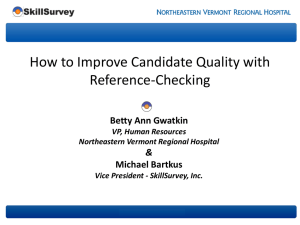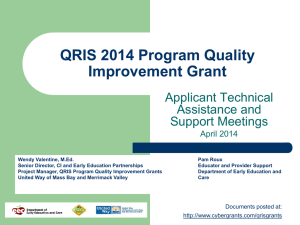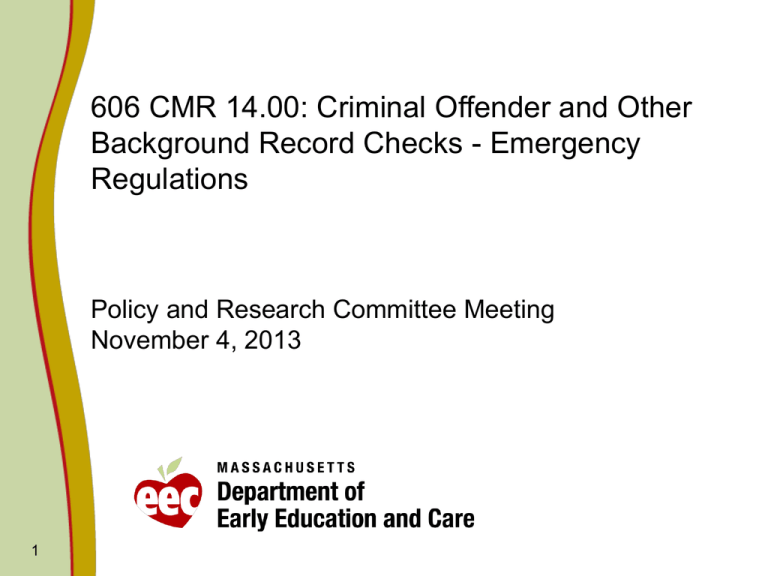
606 CMR 14.00: Criminal Offender and Other
Background Record Checks - Emergency
Regulations
Policy and Research Committee Meeting
November 4, 2013
1
What are the Purposes of Background
Record Checks?
2
Establish standardized procedures for EEC
licensed and/or funded programs regarding the
review of criminal records and other background
information of candidates or incumbents for
employment or regular volunteer positions.
Ensure that employees or other persons regularly
providing child care or support services with
potential for unsupervised contact with children in
any program or facility licensed and/or funded by
EEC are appropriate for serving in their positions.
What Background Record Checks are
Currently Processed by EEC?
3
MA Criminal Offender Record Information Checks (CORI) –
• Information regulated by the Department of Criminal
Justice Information Services (DCJIS) regarding the
criminal histories of persons within the MA Court
System.
• Produces adult/youthful offender convictions, nonconvictions and pending offenses. Indicates any sealed,
juvenile, civil, or non-incarcerable offenses (which EEC
must then request).
Department of Children and Families (DCF) Background
Record Check • Check of the DCF Central Registry and Registry of
Alleged Perpetrators to determine if an individual has
been named as a person responsible for the abuse or
neglect of a child in a supported 51B Report.
Chapter 459 of the Acts of 2012
(amended by Chapter 77 of the Acts of 2013)
4
New law broadening the scope of EEC’s
existing background record check authority
– effective September 1, 2013
Requires and authorizes EEC to conduct
fingerprint-based checks of the state and
national (Federal Bureau of Investigation)
criminal history databases
Requires EEC to conduct Sex Offender
Registry Information (SORI) checks with the
MA Sex Offender Registry Board (SORB)
database
Emergency Regulations
Are NOW Required
5
Allow EEC to comply with the legislative
mandate as soon as possible
Establish processes for conducting SORI
and fingerprint-based checks
Are effective immediately upon filing
(public comments come later)
Proposed Regulatory Changes to Address
SORI and Fingerprint Checks
6
As a condition of an offer of employment, an applicant must
now satisfactorily complete a Background Record Check (BRC)
investigation that includes the CORI, DCF, SORI and FBI
record review.
Applicants will acknowledge that, as a pre-employment
condition and periodically thereafter, personal data elements
will be submitted to the SORB database, in order to determine
if they are Level 2 or Level 3 Registered Sex Offenders.
Applicants will be required to consent to a state and national
criminal history database review and submit to a fingerprintbased scan within fourteen (14) days of notification.
Dissemination of any information related to EEC’s review of
SORI and fingerprint check information, other than EEC’s
approval for hire, is prohibited.
Proposed Regulatory Changes to Address
SORI and Fingerprint Checks – cont’d
7
Background Record Check Frequency
CORI and DCF checks must be run whenever an offer of
employment or volunteer or intern position is made and at least
every 3 years for those employees who have maintained continuous
employment with the same employer unless the employer
determines a greater frequency.
SORI checks must be run whenever an offer of employment or
volunteer or intern position is made and shall be run periodically
thereafter.
Fingerprint-based checks must be run with the same frequency as
CORI and DCF checks with the following exceptions:
• Candidates who have resided outside of Massachusetts
• Candidates who have disclosed that new criminal charges have
been filed against them.
• Candidates who have a break in employment with an EEC
licensed and/or funded program of one or more years
Proposed Regulatory Changes to Address
SORI and Fingerprint Checks – cont’d
8
Findings From SORI Checks
If the SORI check indicates that a Candidate is a Level 2 and/or Level
3 Sex Offender, the finding will be treated as a presumptive
disqualification.
A Candidate may submit written documentation from the Candidate’s
Criminal Justice Official concluding that the Candidate does not pose
an unacceptable risk of harm or, if not available, the Hiring Authority
may seek assessment of the Candidate’s risk of harm from a qualified
mental health professional who concludes in writing that the Candidate
does not pose an unacceptable risk of harm.
If accepted, EEC would then perform a Discretionary Review.
After the Discretionary Review, EEC shall notify the Candidate and the
Employer whether or not the Candidate is approved for hire.
Proposed Regulatory Changes to Address
SORI and Fingerprint Checks – cont’d
9
Findings From SORI Checks – cont’d
No Candidate may be hired conditionally in any capacity nor begin
work until the Hiring Authority receives EEC approval of the SORI
check.
Should EEC determine, through an address match, that an individual
who is a Level 2 or Level 3 Sex Offender resides in a family child
home, EEC will immediately refer this information to the Licensing staff
for appropriate action against the family child care license or
application.
Proposed Regulatory Changes to Address
SORI and Fingerprint Checks – cont’d
10
Findings From FBI Background Record Checks
Results of a Candidate’s FBI check will be provided to EEC.
EEC will review the results of the FBI check and will determine
whether the Candidate poses an unacceptable risk to children.
The hiring authority may allow a Candidate, whose SORI check
has been approved by EEC, and whose CORI and DCF checks have
been approved by the Hiring Authority, to begin conditional
employment and have unsupervised contact with children at the
discretion of the program.
Proposed Regulatory Changes to Address
SORI and Fingerprint Checks – cont’d
11
Findings From FBI Background Record Checks – cont’d
EEC will notify the hiring authority identified by the candidate
whether or not the candidate is approved for hire.
If the Candidate is hired, the Hiring Authority must document in
the employee’s personnel file the date on which the EEC approval
was received and must notify EEC of the date on which the
employee began employment.
If EEC disapproves the candidate, the Hiring Authority must
terminate the conditional employee's employment within fourteen
(14) days of such notice, unless informed by EEC to terminate
sooner.
Proposed Regulatory Changes to Address
SORI and Fingerprint Checks – cont’d
Background Record Checks for Transportation Service Personnel
Background Record Checks for transportation service personnel who
are employees of an EEC-licensed or funded program will be
conducted and documented in accordance with the provisions for
candidates for employment with the potential for unsupervised
contact with children.
EEC-licensed or funded programs that contract for the provision of
transportation services must:
• Include in their contract provisions for the review of CORI and
DCF background records for all personnel providing
transportation services to the program; and
• Assure that a SORI and a fingerprint-based check is approved by
EEC for all personnel providing transportation services to the
program.
12
Proposed Regulatory Changes to Address
Gap in Existing Regulations
13
Notice of a 51A report
EEC shall perform a new background check investigation if it receives
credible notification that a 51A report has been filed against a currently
licensed family child care licensee, a household member/person
regularly on the premises of a family child care home, a family child
care assistant, an employee, volunteer or intern, an in-home nonrelative EEC-funded caregiver, or a driver or monitor.
EEC shall document the results for family child care and in-home nonrelative care and shall forward the relevant information to the Hiring
Authority for employees, volunteers, interns, and transportation
providers.
If the 51B report is supported, EEC may request the family child care
licensee, assistant, and/or in-home non-relative caregiver to
immediately stop providing care, pending a complete BRC review.
An employee, volunteer, intern, or transportation provider shall not
have any unsupervised contact with children pending a complete BRC
review.
Proposed Policies and Procedures
Until fingerprint processing becomes available:
14
All new or renewal applications submitted on or after September
1, 2013 may be approved “conditionally” based on CORI, DCF
and SORI information.
All “conditional” licenses, employment decisions and informal
child care approvals will be tracked by EEC and referred for
fingerprint registration and processing as soon as it becomes
available.
Proposed Policies and Procedures
Once fingerprint processing is available:
15
All new applicants for licensure or approval must complete full
BRC review, including CORI, DCF, SORI and fingerprint (FBI)
review before a license or approval will be issued.
All new applicants for employment, volunteers, interns and
transportation providers, may be hired conditionally pending
results of FBI fingerprint checks, if hiring is determined
necessary, provided that the CORI, DCF and SORI checks are
cleared.
All individuals who began work or applied for a license or funding
before September 1, 2013 must complete fingerprint checks by
September 1, 2016, on a schedule to be developed by EEC.
Next Steps
16
Tasks
Timeline
Presentation of Proposed
Emergency Regulations to Board
November 12, 2013
Anticipated Board Vote to
Approve Emergency Regulations
December 10, 2013
Public Comment Period on
Emergency Regulations
Anticipated Start Date
December 11, 2013 through
mid-January 2014
Implementation of new BRC
requirements
On-going with full
implementation anticipated
later this Fall
Review of Public Comment
January-February 2014
Final Approval of New BRC
Regulations
Anticipated March 11, 2014

